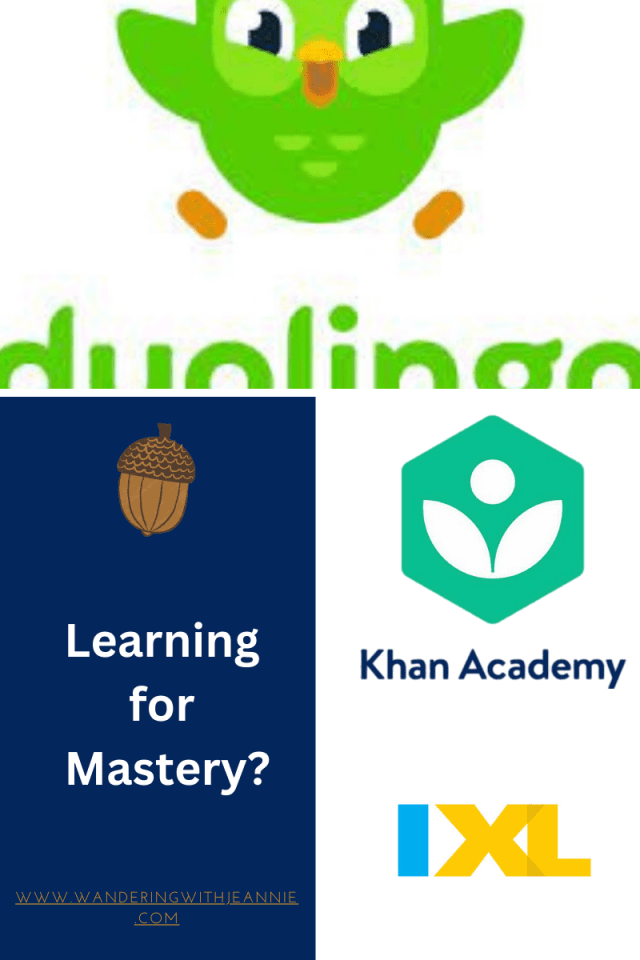



If you have used an online learning platform such as Khan Academy, Duolingo, IXL (not sponsored) or any other online, individual learning platform, you have probably experienced Learning for Mastery. The gist of this theory is that the student must master basic skills and knowledge before moving on to more advanced skills and knowledge. On its own, it makes sense, however one of the critics of Learning for Mastery is that it is exceedingly difficult to implement in a classroom with multiple students at multiple levels of learning and understanding. Many of the critics of Learning for Mastery revolve around how difficult it is to implement in a traditional classroom environment.
And that is a large part of the reason I feel that this is actually a great method for adults who want to learn and master a new skill or field.
As an adult, you are pretty much inherently an individual learner. You are freed from being tied to the progression of a class, free to move at your own pace. As stated earlier, the online learning platforms have capitalized on individualized, paced learning. Is this a superior learning method? Undoubtedly.
How is Learning for Mastery different than what you many have experienced in school?
Think about your school days. If you missed a lesson, day, or week due to illness or vacation, what did the teacher do for you? Maybe they sent you some extra worksheets, maybe, if you were lucky, there was a para who spent a few minutes showing you what you missed. You probably had to do the homework anyway and figure it out on your own.
Learning New Things As An Adult
Now, think about a skill, or area that you have studied on your own. Maybe you taught yourself to play an instrument. Perhaps you bought a book, video, or watched a series on learning to draw, or paint. Did you have to learn new software for work? No matter what it was, you started with the basic tutorials, the introduction, and worked your way through it until you knew the thing.


If you had to take time off for any reason, you could review and pick it up at your own pace. There was no “Class” that moved along without you. It was just you, learning whatever the thing was, at whatever pace was right for you. If you didn’t understand, you could go back and read/listen/watch again. You tried the thing, and self-evaluated how you did. If you liked the result, you might have been inspired to try something else, or to try a variation. Your learning was self-paced. That’s what learning for mastery is, learning at your own pace. It is the natural way that adults learn things. Is there value in allowing youth to learn in the way? Most likely, however, our industrial school complex doesn’t support it. Nor does our government support the people or infrastructure that such a system would require.
So, what do you think?
Perhaps you are thinking that the piece that is missing is having a community of others learning the same material at the same time, the quintessential, classroom environment. And there certainly is value in having the sympathetic support of others on the same path while you are. Maybe, the question to ask yourself, is how can you get the best of both worlds? How can you get the support of others while supporting the pace and path that is right for you? This is where the beauty of the internet truly shines. You can join an online community and have the community to ask your questions, show off your work, and get the support that you crave, and still make progress at your own pace. Facebook, as well as so many other online learning communities such as Skill Share, and the Massive Open Online Courses such as Coursera do an excellent job of both creating a community and giving you the self-paced learning experience (not sponsored). Some people are more motivated by keeping up with others, and there are ways that you can take courses that are on a more traditional timeline as well.
This is part of my series on Organizing Your Life. Learning is one of the pillars of mental health and you can understand more about the basics of Mental Health here.
What are you learning about now? Are you inspired and motivated to keep going on your own, or do you do better with a cohort of others to share the journey?
Want to stay connected? Check out my social media links at the bottom of the page. Want to aways get the latest updates? Sign up for the monthly newsletter below.
 Wandering with Jeannie
Wandering with Jeannie 

